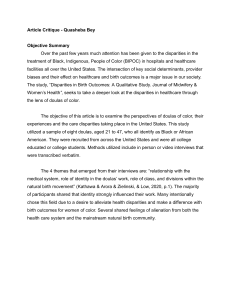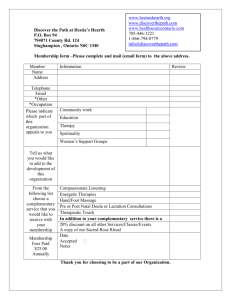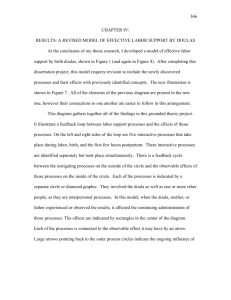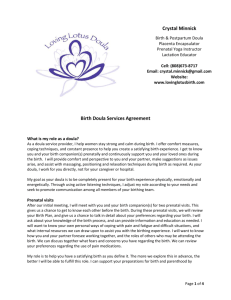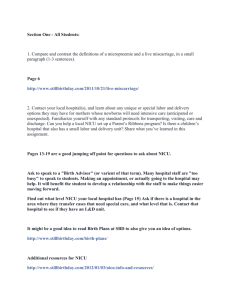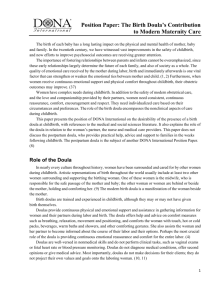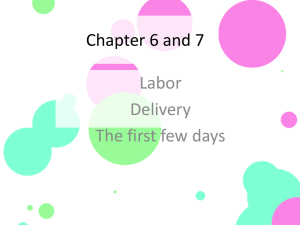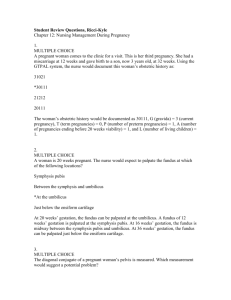Doula Journal Article
advertisement
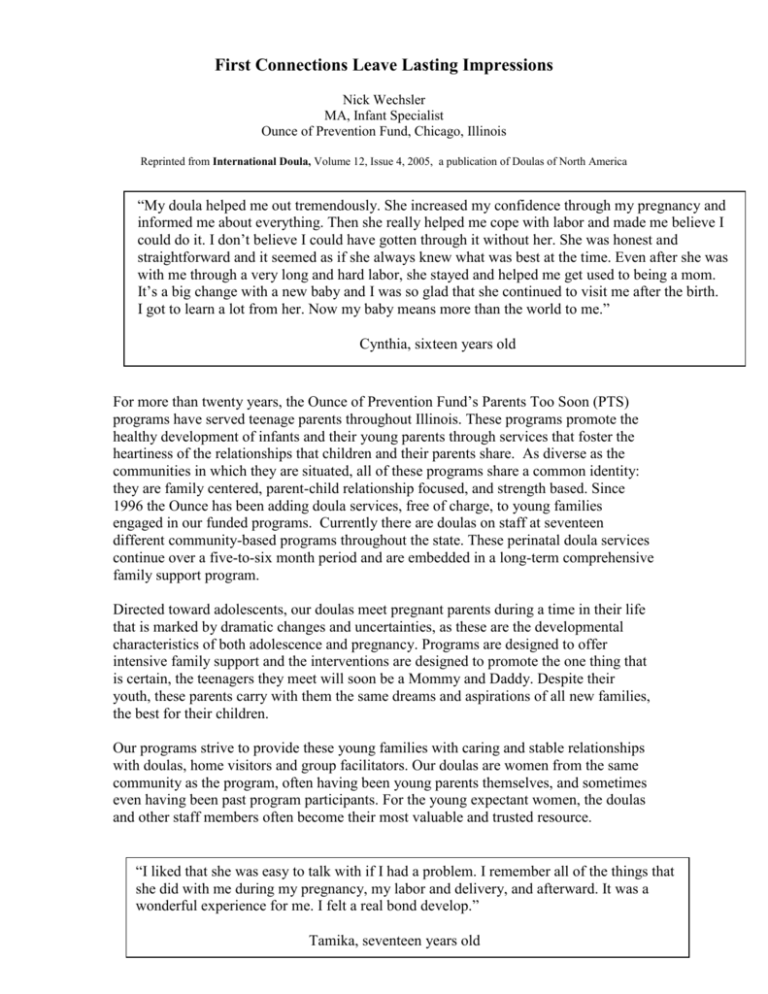
First Connections Leave Lasting Impressions Nick Wechsler MA, Infant Specialist Ounce of Prevention Fund, Chicago, Illinois Reprinted from International Doula, Volume 12, Issue 4, 2005, a publication of Doulas of North America “My doula helped me out tremendously. She increased my confidence through my pregnancy and informed me about everything. Then she really helped me cope with labor and made me believe I could do it. I don’t believe I could have gotten through it without her. She was honest and straightforward and it seemed as if she always knew what was best at the time. Even after she was with me through a very long and hard labor, she stayed and helped me get used to being a mom. It’s a big change with a new baby and I was so glad that she continued to visit me after the birth. I got to learn a lot from her. Now my baby means more than the world to me.” Cynthia, sixteen years old For more than twenty years, the Ounce of Prevention Fund’s Parents Too Soon (PTS) programs have served teenage parents throughout Illinois. These programs promote the healthy development of infants and their young parents through services that foster the heartiness of the relationships that children and their parents share. As diverse as the communities in which they are situated, all of these programs share a common identity: they are family centered, parent-child relationship focused, and strength based. Since 1996 the Ounce has been adding doula services, free of charge, to young families engaged in our funded programs. Currently there are doulas on staff at seventeen different community-based programs throughout the state. These perinatal doula services continue over a five-to-six month period and are embedded in a long-term comprehensive family support program. Directed toward adolescents, our doulas meet pregnant parents during a time in their life that is marked by dramatic changes and uncertainties, as these are the developmental characteristics of both adolescence and pregnancy. Programs are designed to offer intensive family support and the interventions are designed to promote the one thing that is certain, the teenagers they meet will soon be a Mommy and Daddy. Despite their youth, these parents carry with them the same dreams and aspirations of all new families, the best for their children. Our programs strive to provide these young families with caring and stable relationships with doulas, home visitors and group facilitators. Our doulas are women from the same community as the program, often having been young parents themselves, and sometimes even having been past program participants. For the young expectant women, the doulas and other staff members often become their most valuable and trusted resource. “I liked that she was easy to talk with if I had a problem. I remember all of the things that she did with me during my pregnancy, my labor and delivery, and afterward. It was a wonderful experience for me. I felt a real bond develop.” Tamika, seventeen years old Doulas and other staff are trained to join with young parents as they build caring, responsive, and secure relationships with their infants and young children. The programs address the challenging demands and concerns that all teenagers face: relationships with peers, families, and in this instance the fathers of their babies. Staff work to promote health, education, employment and the parent’s and child’s emotional well being. The doulas and their program colleagues are fierce in their commitment to support and advocate on behalf of the young parents. In the last program year alone, 658 adolescent mothers and 442 newborns started their program life with the support of a doula. In our model, doulas receive extensive training. Hired by a local community-based program, each doula is oriented to the local program and trained as a home visitor and then begins her doula pre-training activities. She is provided a library of doula related books, a professional journal, is required to begin observing prenatal classes, accompanying program participants to prenatal medical appointments, and to attend several births as an observer. She brings these experiences to the Doula Foundation Training, which includes 85 hours of direct contact. The foundation training is cofacilitated by Rachel Wickersham, DONA Certified Doula and Trainer. Included in this three month basic training period are the DONA required child birth education hours and the three-day DONA Doula Training. There is time devoted to exploring adolescent development along with individual cultural and family dynamics that impact their lives. The training provides guidance and resources for the prenatal peer groups that the doulas provide in addition to their individual work with young women. The foundation training includes time devoted for lactation education to support their efforts in promoting breastfeeding. Throughout, the doulas continue their community clinical observations and process their experiences as an ongoing part of training. All trainees leave the Ounce’s Doula Foundation Training with a DONA Group Membership and DONA Doula Certification packet. After completing their basic training all doulas continue with regularly scheduled doula in-service training that adds to the development of their professional attitudes, knowledge and skills. These in-services are available to our entire statewide network of more than 30 doulas working in seventeen different locations. Doulas are also trained in a special perinatal intervention created for the Ounce of Prevention Fund, the Community-Based FANA ( Family Administered Neonatal Activities: C-B FANA), a second generation adaptation of the Brazelton Neonatal Assessment Scales. Written for teenagers and used in other settings and with different populations, the C-B FANA is designed to be included in six or more prenatal doula home visits. It includes a structure for the visits and opportunities for anticipatory explorations that help families grow emotionally available, attuned, and engaged with their developing baby within. The C-B FANA prenatal visits serve to build a sense of awareness, parental interest, and wonderment for the teens. They are organized around six infant capacities and parent-child connections that doulas will explore with parents during their postpartum visits following the birth: movement, hearing, behavioral state, touch, smell and taste, and vision. “Because of all of the different things we did while I was pregnant, as soon as he was born I felt as if I already knew him. And then she (doula) held him and I called his name. Snap, just like that he turned his little head and looked me right in the eye. He knew my voice and he knew me. I’m Using the his C-Bmom.” FANA has resulted in teenagers feeling close and being involved with their newborns. This is such a great difference from teenage parents we worked with Juana, fifteen years old years ago who didn’t believe that newborns did anything but sleep, eat, pee, poop, and cry! Teenagers in our programs now are beginning their lives as parents more engaged and enjoying their newborns. Doulas are making critical contributions to the adolescent’s transition from her own world that is a “me thing” into her life as a parent that requires her to share her world as a “we thing”. Doulas are contributing to healthy birth outcomes that build the teenager’s sense of parental self while helping them make informed decisions. Ultimately the doulas use themselves, what they know and how they are, to help young families begin their lives together. “My doula was so sweet and really seemed to care. She was compassionate. It was good having someone to talk with about things that were important to me, not just about the delivery, but about everything. I wish she could forever stay in my life. I’m really going to miss her.” Tina, eighteen years old Doulas have involved these young parents with yet another “new beginning”. They all are eligible to continue in the long-term PTS program that will provide intensive home visiting, peer support groups, and a variety of other program services throughout their child’s first five years of life. Being a parent is a lot to organize for anyone; it is uncertain, ever-changing, always challenging, and sometimes overwhelming. Parenting makes you happy, sad, proud, and scared. All of this happens within a very short period of time. Being a teenager does the same. Having a helpful adult nearby really matters! Teenage parents have all of the biological, emotional, social, educational, and now parental reasons in the world to be in a state of frequent disequilibrium. The doulas and their colleagues help to regulate the teen parent, so that the parent can best care for themselves as well as for their baby. In The Doula Book (2002), Klaus, Kennell and Klaus cite the initial research findings from the Chicago Doula Project, the three site pilot funded by the Robert Wood Johnson and Harris Foundations and provided in conjunction with the Chicago Health Connection. Those dramatic outcomes led to successful advocacy efforts which resulted in the Ounce of Prevention Fund’s doula services now being incorporated into the state’s public funding stream. The Illinois Department of Human Services, the Illinois State Board of Education, and the Chicago Public Schools all contribute to these services now being available as a publicly funded service throughout the state. Now eight years after the initial pilot was launched, the 658 young women served in the past program year were the direct beneficiaries of our state’s public support for doula services. Our work continues to be driven by the dynamic interaction of research, program development, training, and the lessons learned as doulas and programs touch the lives of others. Our work with teenage families, starting in pregnancy and continuing to pre-school has evolved over time. The teenagers and their families continue to challenge us and teach us simultaneously. Doulas have learned how to enter into the teenager’s family in a manner that respects their natural roles and especially the teen’s mother’s place in supporting her daughter. Many times the doulas have become a vehicle for both the teenager and her mom to travel to this new destination, motherhood, together. Doula: “So Hilda, you’re just a few weeks away from having your baby, have you made plans about who will be with us at the hospital?” Hilda: “ Well sort of… I know my boyfriend said he’d be there. I think he will.” Doula: “ What about your mama, have you spoken with her about it yet?” Hilda: “ I guess she’ll be there, we haven’t really talked about it.” Doula: “ Do you remember all of the things we’ve been talking about for the last few weeks about getting ready for baby, about being ready for the hospital and then for getting back home with the baby? You’ve done such a beautiful job. It’s like you’ve built a nest for your baby and each thing you’ve prepared for and accomplished is another twig for the nest. Hilda looks at her doula with a half a smile and waits for what is coming next. Doula: “Well your nest needs just one more twig to make it complete and ready for baby. Your mama probably is waiting for you to ask her to help. I know she wants to be there for you. She’s so proud of how well you’ve taken care of yourself. What do you think it will be like when you ask her?” Hilda’s smile widens: “I know she wants to be with me. I want her to. I’ll ask.” Hilda, fifteen years old The doulas have developed great appreciation for the fathers of the babies. They have found themselves holding the dad’s hands and encouraging them to focus and take deep breaths, just as they do for the moms. For some doulas this has meant confronting some of their own feelings about the men in the young women’s lives. As they become more experienced and explore their work through ongoing training and collegial support, the doulas have become efficient in assisting young families negotiate a medical system that can easily overwhelm and alienate mature adults. Their finesse as well-informed advocates is emboldened by the recognition and respect they have earned over time by medical providers and hospital staff who appreciate their contribution to successful birthing experiences and outcomes. The doulas do not speak for the teens, but rather strive to bolster the teens own voice. The teenagers themselves feel the strength that the doulas bring to their work, but they feel it personally and in a manner that makes them feel worthy, stronger, and more able. These are empowering experiences. In our work with teenagers this is no easy task. It is however the single most critical quality of our work as teenagers look for situations where they can count on someone “watching their back” as they “do their own thing”. While building a network of doula services throughout the state over the past eight years we have faced many program development challenges. We leaned heavily on the learned and earned experiences of doulas from around the country as we translated what traditionally is an individual arrangement that is sought out, into a social service program that families enter into and subsequently learn about the doula services that are available to them. Our programs have dealt with numerous issues from how to provide continuous support during the birthing process in the context of an agency’s personnel regulations to issues of staff back-up, liability, and a host of infrastructure elements designed to support the programs as well as the doulas. We continue to grapple with what may be the single greatest difference between our design and that of either hospital-based or private doulas; getting the call at the onset of labor. Unlike those families who have paid for the service and anticipate doula support, young families in our programs have a different relationship to the services. In part this may be due to the mothers’ age and developmental status along with how their families exert their own preferences and influence at the onset of labor. Recognizing the power of doula supported births, we continuously reflect on our program design and our practices in order to create the greatest opportunities for doulas to be able join with young parents and their own support systems at the births. It was strange for me at first, I didn’t know what she (the doula) wanted me to do or how to fit in. As soon as she looked me right in the eye and asked me how all of this was really making me feel, and what I wanted to know, I realized that she cared about me too and wanted me to be involved. She was cool and it was real comfortable. After my son was born she asked me to unbutton my shirt and to hold him close. She told me that he was hungry for the warm touching I could give him. Cedric, nineteen years old Doula services, framed in our programs as psycho-social support, have become a perfect portal into our relationship-based type of program, one that recognizes, acknowledges, and addresses all of the critical demands facing adolescents in their own growth and development, but focuses the core of its work with these young families on building healthy, happy, and secure relationships between parents and their children. We have begun to appreciate how the profound lessons that are the crux of a doula’s role, mothering the mother so that she is better able to mother her child, serves as a working model for our overall programs. In recent years there has been growing interest in a specialized area of work referred to as “infant mental health services”. Our appreciation of this approach grows in part from our experiences of mothering the mother. In its simplest form, infant mental health is holding the present as a way of understanding the past in order to create the future. Quite literally each time a doula places her own hand on top of the teen’s hand as it rests on baby before or after birth, the doula’s presence in the teen mother’s life can serve to both awaken and calm feelings from the past that must be cleared to make safe passage for the future. The understanding, support, and calming sense of purpose and order that a doula brings to the birthing process, a process that can incite past experiences and evoke primal expressions reaching all the way back to childhood, gives the doulas opportunities to co-create a new life script, one of a competent and able parent. Doulas build the teen’s sense of parental self-esteem. Working with teenagers we must expect all of the delightful as well as the frightening challenges they bring to us. We must find ways to accept them for all of the ways that they are. So much of their own development is based on how both peers and adults respond to them and either accept or reject their way of being. Doulas enter their lives in a magical moment, a time that they feel brings new beginnings, not only for their soon to be born child, but for themselves as well. This, the biggest life change they have yet experienced, brings an opportunity for them to “start over” and be just the way they imagine a mom is supposed to be. Teenagers thrive in situations where they don’t have to sacrifice their expressions of independence while still being able to maintain the shelter of knowing that someone knows, cares, and believes they are able to do the right thing for themselves and their babies. In our program doulas “do the right thing” for young parents. While traveling along the teens transition to parenthood, doulas touch the heart, nurture the soul, and raise the spirits of the teenage mothers. Last year alone, 442 newborns and their families benefited from doulas working in Ounce of Prevention funded programs. They will carry their doula and program experiences throughout their lives. First connections leave lasting impressions. The doulas carry this mission into their work every day. Nick Wechsler, MA, Infant Specialist is the Assistant Director for Program Development for the Ounce of Prevention Fund’s Parents Too Soon division (www.ounceofprevention.org; 312 922-3863). He has been involved in developing doula services as an integral component of long-term parenting and family support programs since 1996. He is a co-author of the training manual, The Community-Based FANA: Teen Mothers, Fathers, and Their Babies Promoting Mutual Growth and Attachment. The young parents' voices in this article are compilations of evaluations, notes, and video tapes from many teenagers who have used the doula services. Thanks to the young moms and staff from: Aunt Martha’s Youth Service Center, Chicago Heights, Il, The Center for Children’s Services, Danville, IL, and Greater DuPage Healthy Families MYM, Glen Ellyn, Il.
